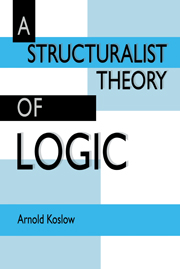Book contents
- Frontmatter
- Contents
- Preface
- Part I Background
- Part II Implication relations
- Part III The logical operators
- 11 Hypotheticals
- 12 Negations
- 13 Conjunctions
- 14 The disjunction operator
- 15 The logical operators parameterized
- 16 Further features of the operators
- 17 The dual of negation: Classical and nonclassical implication structures
- 18 The distinctness and relative power of the logical operators
- 19 Extensionality
- 20 Quantification
- 21 Identity
- 22 Special structures I: Logical operators on individuals: Mereology reconstituted
- 23 Special structures II: Interrogatives and implication relations
- 24 Completeness
- Part IV The modal operators
- Appendix A An implication relation for the integers in the programming language BASIC
- Appendix B Symmetric sequents as products of implication relations and their duals
- Appendix C Component-style logical operators and relevance
- Notes
- Bibliography
- Index
14 - The disjunction operator
Published online by Cambridge University Press: 05 May 2010
- Frontmatter
- Contents
- Preface
- Part I Background
- Part II Implication relations
- Part III The logical operators
- 11 Hypotheticals
- 12 Negations
- 13 Conjunctions
- 14 The disjunction operator
- 15 The logical operators parameterized
- 16 Further features of the operators
- 17 The dual of negation: Classical and nonclassical implication structures
- 18 The distinctness and relative power of the logical operators
- 19 Extensionality
- 20 Quantification
- 21 Identity
- 22 Special structures I: Logical operators on individuals: Mereology reconstituted
- 23 Special structures II: Interrogatives and implication relations
- 24 Completeness
- Part IV The modal operators
- Appendix A An implication relation for the integers in the programming language BASIC
- Appendix B Symmetric sequents as products of implication relations and their duals
- Appendix C Component-style logical operators and relevance
- Notes
- Bibliography
- Index
Summary
Disjunction: the simple characterization
We saw in preceding chapters how the duals of various logical operators can be defined. In the case of the hypothetical, H, its dual, Ĥ, has rarely been studied, if at all. In the case of negation, as we pointed out, the dual N̂ has an important role to play in the study of generalizations of classical results within nonclassical implication structures. Likewise with conjunctions: The dual of conjunction, Ĉ, is just conjunction on the dual structure Î and is, as we noted, a logical operator on I as well. But contemporary logicians think of the dual of conjunction not merely as the dual of an operator, but as an important logical operator in its own right. There is a direct characterization of Ĉ as a logical operator on I, since Ĉ is, as we indicated in the preceding chapter, a well-known logical operator on I in its own right, namely, disjunction on I.
Let I = 〈S, ⇒〉 be an implication structure. For any A and B in S, the logical operator of disjunction is a function that satisfies the following two conditions:
D1. For any T in S, if A ⇒ T and B ⇒ T, then D(A, B) ⇒ T, and
D2. D(A, B) is the weakest member in S to satisfy the first condition. That is, for any U in S, if [for all T in S, if A ⇒ T and B ⇒ T, then U⇒ T], then U ⇒ D(A, B).
Information
- Type
- Chapter
- Information
- A Structuralist Theory of Logic , pp. 117 - 126Publisher: Cambridge University PressPrint publication year: 1992
